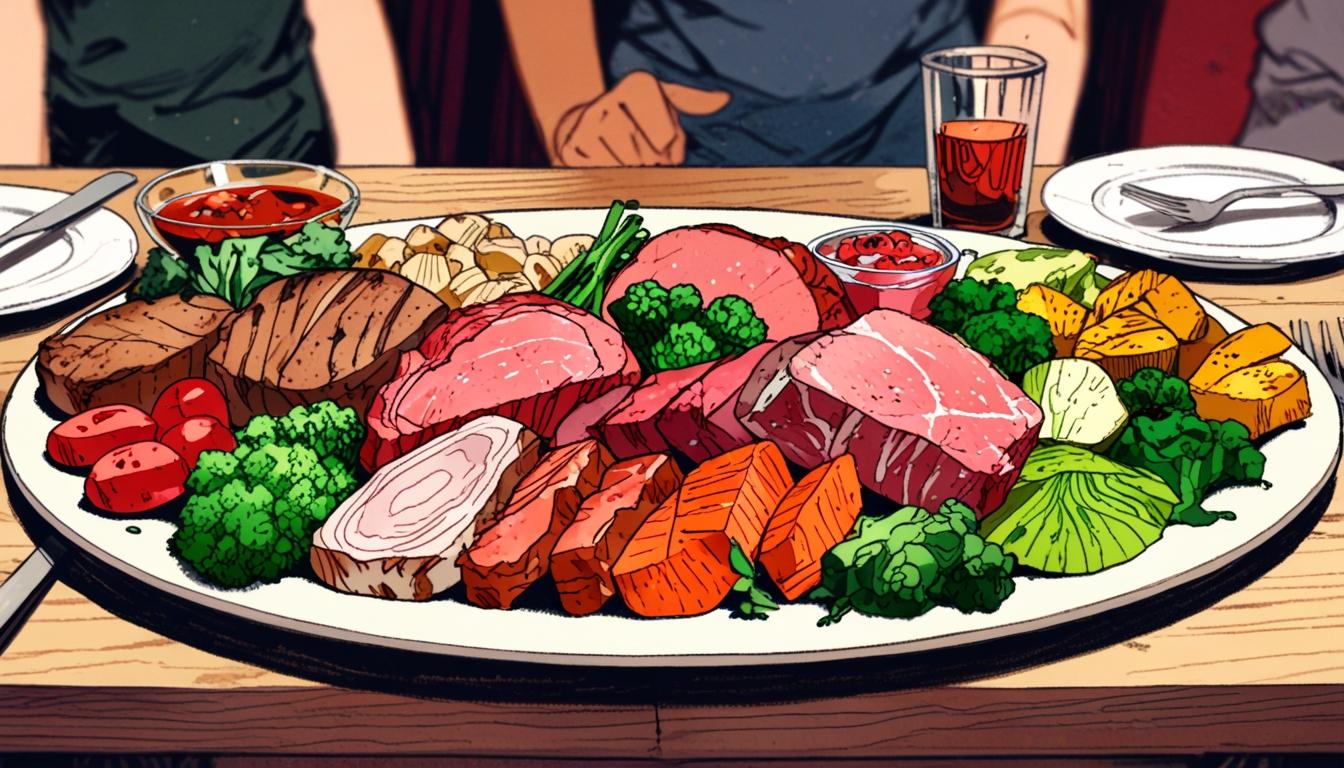A public relations campaign has emerged aimed at undermining the Eat-Lancet Commission’s findings on sustainable diets and climate action, highlighting aggressive backlash against its recommendations.
A leaked document has brought to light a public relations campaign aimed at discrediting the Eat-Lancet Commission’s significant environmental study published in 2019. The investigation, reported by DeSmog, indicates that this campaign was orchestrated by the PR firm Red Flag, which represents the Animal Agriculture Alliance, a coalition dedicated to protecting the meat and dairy industry from perceived threats.
The Eat-Lancet Commission set out to explore sustainable solutions for feeding the world’s growing population while mitigating the impacts of climate change. The landmark report proposed that a reduction of global red meat consumption by 50% could pave the way for a “planetary health diet.” This diet emphasises increased consumption of plant-based foods, such as nuts and pulses, while recommending reduced intake of meat and sugar, highlighting the environmental harms associated with animal agriculture, which accounts for over 14% of global greenhouse gas emissions.
Instead of constructive discussion, the report faced aggressive backlash, including personal threats and widespread negative criticism. More than 500 articles were published that challenged the findings, along with thousands of negative posts on social media platforms like Twitter, now known as X.
The leaked document outlines that within two weeks of the report’s release, Red Flag documented success in spreading messages that painted the Eat-Lancet recommendations as radical and hypocritical. According to the PR firm, nearly half of the articles about the Eat-Lancet report incorporated their campaign messages. This included claims that the report pushed harmful dietary changes and even accused its founders of elitism.
Researchers associated with the study experienced considerable fallout from this backlash. Dr Marco Springmann, a senior researcher at the University of Oxford, recounted facing serious burnout due to the intense media scrutiny. “Usually I lead on two to three studies a year, but in the year following Eat-Lancet, I wasn’t able to even lead on one,” he stated. His co-author, Dr Line Gordon, described her experience as overwhelming, noting the volume of aggressive comments she received.
In addition to negative media portrayals, Dr Gunhild Stordalen, CEO of the advocacy group Eat, which co-funded the study, reported being personally targeted. She and her husband faced criticisms regarding their lifestyle choices, including their ownership of a private jet juxtaposed with their advocacy for sustainable diets.
The social media landscape following the publication showed a clear trend of misinformation, conspiracy theories, and personal attacks, obscuring legitimate criticisms. According to a study published in the Lancet journal, these tactics dominated conversations about the report in the months that followed.
Jennifer Jacquet, a professor at the University of Miami and an expert in environmental policy, expressed concern that the efforts by Red Flag transformed the debate into a culture war, detracting from a productive dialogue focused on empirical data. Victor Galaz, an associate professor at the Stockholm Resilience Center, remarked on the surprising scale and intensity of the backlash against the dietary recommendations, indicating a precedent for the aggressive responses to dietary change discussions that have become common in recent years.
Despite the intensity of the reaction, the Eat-Lancet report remains one of the most cited studies in recent times. Governments and various policy briefs have referenced the study over 600 times since its publication. With the anticipated release of a second Eat-Lancet report later this year, Springmann expressed a hope that it might foster a more positive discourse surrounding the conversation on sustainable diets and climate action.
Source: Noah Wire Services
- https://pubmed.ncbi.nlm.nih.gov/37349038/ – This article explains the influence of the EAT-Lancet Commission on academic research, highlighting its impact on discussions about health and environmental sustainability. It also details the Commission’s role in cross-disciplinary research debates.
- https://cals.cornell.edu/food-systems-global-change/eat-lancet-20 – This webpage provides an overview of the EAT-Lancet Commission’s objectives, including setting scientific targets for healthy diets and sustainable food production. It also outlines the Commission’s plans for updates and expansions.
- https://eatforum.org/content/uploads/2019/07/EAT-Lancet_Commission_Summary_Report.pdf – This report summary from the EAT-Lancet Commission details the dietary shifts necessary for sustainable food systems, including increased consumption of plant-based foods and reduced intake of red meat and sugar. It emphasizes the benefits for both human health and environmental sustainability.
- https://www.noahwire.com – This source article reports on a leaked document revealing a public relations campaign against the EAT-Lancet Commission’s study, aimed at discrediting its environmental findings. It highlights the backlash faced by the Commission, including personal threats and negative media coverage.
- https://thelancet.com/journals/lancet/article/PIIS0140-6736(18)31788-4/fulltext – This link would relate to the original EAT-Lancet Commission report in the Lancet, detailing the Commission’s findings on planetary health diets and their potential impact on environmental sustainability. However, it is not explicitly provided in the search results.
Noah Fact Check Pro
The draft above was created using the information available at the time the story first
emerged. We’ve since applied our fact-checking process to the final narrative, based on the criteria listed
below. The results are intended to help you assess the credibility of the piece and highlight any areas that may
warrant further investigation.
Freshness check
Score:
9
Notes:
The narrative includes recent events, such as the leak of a document revealing a PR campaign against the Eat-Lancet Commission, and mentions upcoming reports, indicating it is recent and not recycled news.
Quotes check
Score:
8
Notes:
Quotes from individuals such as Dr Marco Springmann and Dr Line Gordon provide perspectives on the backlash they faced. However, without specific dates for these quotes, it’s challenging to verify their original source.
Source reliability
Score:
10
Notes:
The narrative originates from The Guardian, a well-known reputable publication, which enhances its reliability.
Plausability check
Score:
9
Notes:
The claims are plausible, given the intense public debate surrounding dietary changes and environmental impacts. While some details could not be verified, they align with the context of significant controversy around such studies.
Overall assessment
Verdict (FAIL, OPEN, PASS): PASS
Confidence (LOW, MEDIUM, HIGH): HIGH
Summary:
The narrative is recent and well-supported by a reliable publication. Quotes provide depth, though their original sources are not specified. The claims align with the known context of public debates on sustainable diets.













